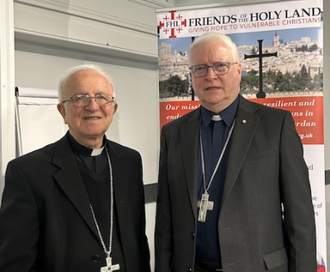London: Jerusalem bishop addresses ecumenical gathering

Bishop William Shomali with Bishop Jim Curry
Bishop William Shomali, Patriarchal Vicar for Jerusalem and Palestine, gave a moving account on the situation of Christians in the Holy Land at Bloomsbury Baptist Church in London on Monday. The ecumenical event was attended by representatives from many denominations, including Bishop Jim Curry from RC Diocese of Westminster and Bishop Mike Royal, General Secretary of Churches Together.
Bishop Shomali began with a summary of the history of the Holy Land, which he said has been suffering from a "devastating conflict for the past hundred years." While the Jewish people, based on their interpretation of the Bible claim the land is theirs given to Abraham and his descendants by God, the Palestinians assert that their roots date back to the Canaanites who lived there 3000 years BC. Thus he said: "There are two narratives, two claims and two perspectives on the history and geography of the land."
"My intention is not to advocate for one side against the other or to discuss the injustices and crimes committed in this land called Holy" Bishop Shomali said. "Instead I aim to present the situation from a humanitarian perspective and delve into the condition of the Christian community which has lived there for 2000 years without interruption."
He pointed out that there are about 185,000 Christians in Israel, within a population of nine million, while in Palestine they number 45,000 in a population of five million. In Jordan there are 170,000 Christians out of a population of eleven million.
He discussed the role of Christian-Related Organizations (CROs), including the Latin Patriarchate, Friends of the Holy Land and various dioceses in fostering hope for peace and economic recovery, through their ongoing projects in education, healthcare, and social development. Their efforts continue to provide essential services to hundreds of thousands of Palestinians, preserving the Christian identity, witness, and culture in a challenging environment.
Palestine faces an unemployment level of about 50% - higher in Bethlehem now since tourism virtually stopped since 7 October 2023. Before the war, many Palestinians in the West Bank worked in Israel, bringing home millions of shekels each week. For the past 18 months most work permits have been cancelled. The high unemployment rate has tripled the demand for humanitarian aid from the various church programmes.
Bishop Shomali said travel around the West Bank has been made very difficult because there are more than 900 checkpoints and barriers - making it difficult for everyone to access work, healthcare and education.
Family life is very difficult for people who have relatives in Israel as people need permits to travel even short distances.
As a consequence of these problems, over the years more than one million Palestinian Christians have emigrated - to Chile, to Australia, the USA, Canada and Europe.
Bishop Shomali said the threats of forcible expulsion of Palestinians from Gaza and the West Bank, with the support of the Israeli government are increasing. Many new illegal Israeli settlements are being established across the West Bank - with weekly evictions and demolitions of Palestinian homes.
Turning to Gaza, he said, the humanitarian situation there is "beyond imagination". For a short time during the recent ceasefire, the Latin Patriarchate, with the assistance of oversees donors, was able to deliver food to Gaza parishes and their neighbours - both Christian and Muslim. Since the war reignited, he said they have been unable to deliver any aid.
Bishop Shomali went on to outline what gives hope in these difficult times - pointing out that the strongest foundation is faith in Jesus Christ. This faith can give the resilience and willingness to continue, despite all the hardships.
He said: "I recently celebrated the Annunciation Feast in Beit Jala. The church was packed and the celebration was vibrant. I greeted the faithful at the gate of the church and felt they were like a big family and knew each other. This sense of community is a factor of hope." He said the solidarity of the universal church was a great source of strength. He pointed out that Pope Francis before his illness rang the parish in Gaza every day to get their news.
He thanked the many associations and diocese in Germany, Italy Great Britain and elsewhere who faithfully support the Christian community in the Holy Land with schools, universities, parish support, humanitarian programmes, housing and healthcare.
The event, presented by Friends of the Holy Land concluded with a brief Q&A. Bishop Mike Royal, General Secretary of Churches Together gave his heartfelt thanks at the end of the talk, pledging everyone's continuing support and prayers.
This event was hosted by Friends of the Holy Land. To support their work see: www.friendsoftheholyland.org.uk/


















